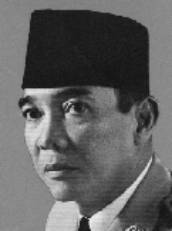 |
Sukarno (1901-1970)
|
1958, Indonesia: The Failed Overthrow
By Deirdre Griswold
In their authoritative book about the CIA called The Invisible Government, Washington correspondents Thomas Ross and David Wise relate how the U.S. supplied a right-wing rebel force in Indonesia with arms and a small air force of B-26 bombers in an attempt to overthrow President Sukarno. The attempt failed, but not before Allen Pope, a U.S. pilot who "was flying for the CIA" was captured by loyalist forces.
Kennedy arranged for Pope's exchange and invited Sukarno to the U.S. During the visit, Kennedy commented to one of his aides "No wonder Sukarno doesn't like us very much. He has to sit down with the people who tried to overthrow him."
Arthur Schlesinger, Jr., in his biography of Kennedy, says Sukarno's "deep mistrust of the West was understandably compounded by his knowledge that in 1958 the CIA had participated in an effort to overthrow him" (A Thousand Days).
Wise and Ross point out some U.S. reasons for being favorable to the right-wing generals: "Many in the CIA and the State Department saw merit in supporting these dissident elements. Even if Sukarno was not overthrown, they argued, it might be possible for Sumatra, Indonesia's big oil producer, to secede, thereby protecting private U.S. and Dutch holdings. At the very least, the pressures of rebellion might loosen Sukarno's ties with the Communists and force him to move to the right. At best, the army, headed by General Nasution, an anti-communist, might come over to the rebels and force wholesale changes to the liking of the U.S." (The Invisible Government).
Articles written by a Times team of journalists said that in Indonesia in 1958, "the CIA was authorized to fly supplies from Taiwan and the Philippines to aid army officers rebelling against President Sukarno in Sumatra and Java. A U.S. pilot was shot down on a bombing mission and was released only at the insistent urging of the Kennedy Administration in 1962." (New York Times, April 25, 1966)
As the position of the Indonesian government moved to the left after 1958, there is every indication that the influence of the CIA deepened in the Indonesian military's right-wing circles. Control over the army was the key factor in undermining the Sukarno regime, and every effort was bent in this direction. Senator Eugene J. McCarthy, discussed the effects that the U.S. "military assistance" program has on foreign policy. He wrote: "Supplying arms opens the way to influence on the military and also on the political policies of the recipient countries. When an arms deal is concluded, the military hardware is only the first step. Almost invariably, a training mission is needed and the recipient country becomes dependent on the supplier for spare parts and other ordnance.... Indonesia, where military elements appear to have taken de facto control of the government in the wake of recent turmoil, received, in addition to Soviet military assistance, nearly $64,000,000 in military-grant aid from the U.S. between 1959 and 1965" (Saturday Review, July 9, 1966). When Sukarno told the U.S. "To hell with your aid!" he was trying to break loose from this armored stranglehold.
Source: Excerpted from "1958: The First CIA Attempt," in Indonesia 1965: Second Greatest Crime of the Century, 1998.
www.workers.org/indonesia/chap2.html
Founded Partai Nasional Indonesia and challenged Dutch colonialism (1927)
Jailed by the Dutch (1929-1931)
Exiled to Flores and Sumatra (1933-1942)
first president of Indonesia (1949-1966)